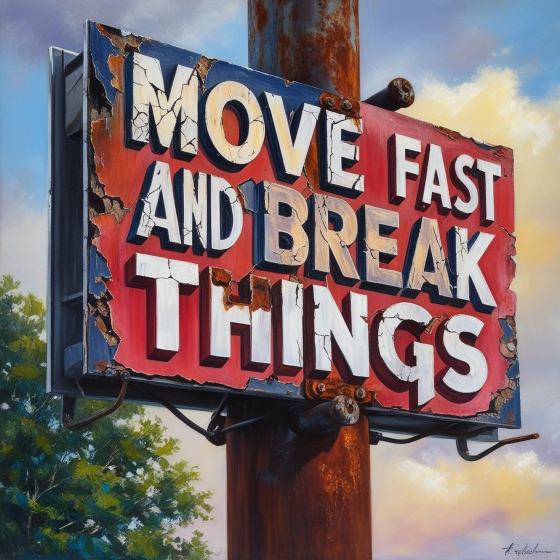
Move fast and break things that can be fixed
“Move fast and break things” gets a bad rap these days.
When Mark Zuckerberg first uttered these words in the early 2000s, the tech industry ate it up. Facebook and others were in hyper growth mode. Ethical considerations and long-term consequences were thrown to the wind in favor of short-term gain.
But we all know how that ended.
Data breaches, fake news, harassment and hate, racism, service outages, legal battles, and bans gradually gave way to the “Move slow and fix things” era. Facebook, Twitter, Uber, Robinhood, TikTok, Instagram, Google, so many of the tech giants that once championed this “growth at any cost” mentality began shifting their thinking.
And that’s a generally good thing.
But we still need to move fast and break things. We just need to be careful that what we break can be fixed.
“Someone needs to bring the site back up right now!”
I recently listened to Joel Lewenstein tell a story about how we brought down the Quora website a few weeks after joining the company:
I pushed a change to production that took down the website and I didn’t know how to fix it. […] I was like ‘Well, I’m gonna get fired. It’s been a fun two weeks, it’s been fun.’ Literally that hour [my boss] asks me for coffee. She lets me vent and feel bad, and then she says ‘If you are not breaking the site, you are not pushing enough. This is a good sign. This is a sign that you are trying stuff and moving quickly.’
- Joel Lewenstein
I love this. This is the vibe I try to bring to my own team. I often say “Relax, it’s only computers.”
Now I work in a non-regulated industry where decisions are not life and death. This approach doesn’t work in industries like healthcare, finance, or government. YMMV.
For the rest of us with this privilege, we shouldn’t waste it. Move fast. Try things. Bend the rules. Learn from failures. Ask forgiveness, not permission.
Of course, there are a few exceptions.
| ❌ Serious risk | ✅ Not-so-serious risk |
|---|---|
| Could this cost us a lot of money (eg. broken SLAs)? | Would this cost us a little money short-term? |
| Could our customers’ privacy be violated (eg. a data breach)? | Would we be able to recover any data that got out? |
| Could our reputation be irreparably damaged (eg. will this be major news)? | Would this be a temporary blip on the radar? |
| Could this have major societal consequences (eg. misinformation or election fraud)? | Would this only impact a small group of people? |
We all need to slow down and be more deliberate sometimes. Being able to identify when is the key.
I’m coaching my team through this: Knowing which decisions we can make quickly and undo if we’re wrong vs. which decisions we should take more time to thoroughly consider.
Being able to tell the difference is a superpower. It allows us to move quickly when we can while avoiding mistakes of the “move fast and break things” era.
The site’s back up
After Joel took down the Quora website, someone got it back up pretty quickly. Did they lose some money because of the outage? Probably. Was their reputation dented? Maybe a little. Were people ruined financially? Did anyone die? Surely not.
The outage was short-lived and reversible. Quora continued to move quickly without too much process or overhead. That’s what I want for my team.
Relax, it’s only computers.
